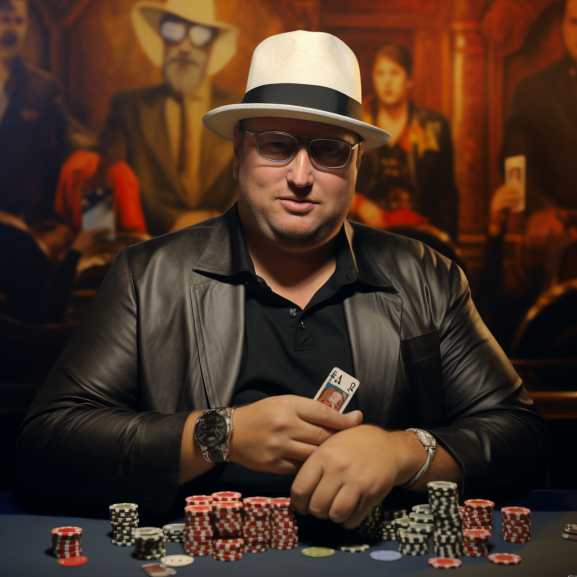Greg Raymer: The Cinderella Story of Poker’s Amateur Turned Pro
In a world where professional poker is often a game of the elite and seasoned players, Greg Raymer’s story stands out as exceptionally unorthodox. A patent attorney by training and an amateur poker enthusiast, Raymer etched his name into poker history by winning the World Series of Poker (WSOP) Main Event in 2004. Beyond this, he has successfully channeled his interests into writing and business endeavors, crafting an impressive multi-faceted career.
The Amateur Era
Greg Raymer came into the limelight as an amateur player with an unassuming presence. But don’t let that description mislead you. Even as an amateur, Raymer demonstrated a shrewd understanding of the game’s complexities. His analytical approach was cultivated during his years as a patent attorney, a background that endowed him with the ability to discern patterns and calculate odds.
A Dream Realized: The 2004 WSOP Win
The 2004 World Series of Poker Main Event was an eye-opener for the poker community. Raymer’s win shook the foundations of what was considered possible by an amateur in a field teeming with professionals. The “Cinderella story” analogy couldn’t be more apt, as he bested a pool of more seasoned players to clinch the championship.
A Protagonist in Poker’s Changing Landscape
After the 2004 victory, Raymer made the bold move to pursue poker full-time, reinforcing the notion that the WSOP win wasn’t mere luck but rather a manifestation of skill and strategy. In doing so, he served as a precursor to the new wave of poker players who transitioned from amateur to professional status. His successful transition suggested that, with sufficient dedication and analytical ability, poker could serve as a viable career path for those outside the established pro circuit.
The Author and Businessman
Greg Raymer has never been one to rest on his laurels. His interests extend beyond the poker table into writing and business. He has penned books that delve into the strategies and psychology of poker, drawing on his unique experiences to educate and inspire a new generation of players. In the business realm, Raymer has also achieved success, employing the same principles of risk-assessment and strategy formulation that served him so well in poker.
Community Contributions and Legacy
Raymer has been an advocate for the game, not just playing it but also seeking ways to contribute to its growth and popularity. He has been involved in organizing events and charity poker tournaments, helping to foster a strong and vibrant poker community.
Greg Raymer’s story is truly captivating and serves as an encouragement for those who dream of achieving big in areas they are passionate about, even if they start as amateurs. His journey to win the 2004 WSOP Main Event is remarkable, not just for the win itself, but for what it symbolizes in the broader context of poker and, perhaps, life’s pursuits in general.
The term “Cinderella story” is often overused, but in Raymer’s case, it’s fitting. His win disrupted the notion that only full-time, seasoned professionals could achieve such high levels of success in the world of poker. This win wasn’t just for Raymer; it was for every amateur player who had been told they didn’t stand a chance against the pros. It redefined what was considered possible and served as an inspiration for a whole new cohort of players who would take the plunge into professional poker in the years that followed.
His background as a patent attorney is a curious yet integral part of his success. Often, we compartmentalize careers, talents, and skills into separate boxes, rarely considering how they can cross-pollinate and contribute to success in different arenas. Raymer’s analytical skills, honed during his years in the legal field, served him exceptionally well at the poker table. It’s a striking illustration of how transferable skills can be more valuable than specialized talents confined to a single domain.
Furthermore, Raymer’s subsequent ventures into writing and business have proven that his analytical approach is not confined to poker alone. It suggests a highly adaptable mindset capable of shifting gears between different types of intellectual engagement. His books provide readers with a practical roadmap, based on firsthand experience, which is invaluable in an area often shrouded in myth and misinformation.
Greg Raymer’s story is a potent mix of skill, timing, and perhaps a little serendipity, showing us that the boundary between amateur and professional can sometimes be just a single, transformative experience. His narrative continues to serve as a catalyst for others who dare to dream beyond conventional boundaries, and his influence on the world of poker is likely to be felt for years to come.
Greg Raymer is not your typical poker champion. His journey from amateur to world champion, followed by successful stints in writing and business, exemplifies a unique trajectory in the professional poker scene. Raymer’s story provides compelling proof that poker is not merely a game of chance, but one where skill, strategy, and, indeed, a bit of fairy-tale magic, can make all the difference.

